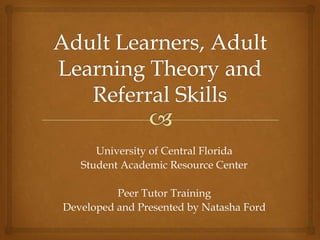
Adult learning theory
- 1. University of Central Florida Student Academic Resource Center Peer Tutor Training Developed and Presented by Natasha Ford
- 2. UCF STUDENT PROFILE - FALL 2012 Enrollment by Gender Undergraduate Male 23,139 Female 27,829 Graduate Age Distribution Male 3,590 Freshman 19 Female 4,932 Florida Residency Status Sophomore 20 Medical 56,688 94.8% In-State Junior 23 Male 136 3,079 5.2% Out-of-State Senior 25 Female 141 59,767 Total Percent over age University Total 24% 25: Male 26,865 Overall Average 24 Female 32,902 Age
- 3. Adult Learning Theory Materials herein adapted from: Knowles, M. (1996). Adult Learning. In Robert L. Craig (Ed.), The ASTD Training and Development Handbook (pp. 253-264). NY: McGraw-Hill. Adult Learners video for Walden University http://www.youtube.com/watch?v=aee4ONWZFj0&f eature=related "Working with Student Veterans and Other Adult Learners" by Jill Cooley, University of Central Florida Veteran's Academic Resource Center.
- 4. Qualities of Adult Learners Adults have a need to know why they should learn something. Adults spend a considerable amount of time and energy weighing the costs and benefits of learning something before they are willing to invest time in learning it. Adults have a deep need to be self-directing. The psychological definition of "adult" is one who has achieved a self-concept of being in charge of his or her own life, of being responsible for making his or her own decisions and living with the consequences. Adults have a need to be seen by others as being capable and responsible for themselves.
- 5. Qualities of Adult Learners Continued Adults have a greater volume and different quality of experience than youth. Adults have a background of experience that is very valuable in a learning environment Discussing and reflecting on past experiences strengthens the understanding of learning material in the classroom with learning from life experiences and will deepen and enrich the learning done Adults become ready to learn when they experience a need to know or be able to do in order to perform more effectively and satisfyingly. Adults again must see a need for the information before learning will take place.
- 6. Qualities of Adult Learners Continued Adults enter into a learning experience with a task-centered (or problem- centered or life-centered) orientation to learning. Youth (conditioned by schools) have a subject-centered orientation to learning where they focus on learning content to pass a test. Adults by virtue of life and work experiences develop a task-centered or problem-centered orientation to learning. If tutoring is developed around problem solving, then adults will learn content with the intention of using it. Adults are motivated to learn by both extrinsic and intrinsic motivators. Learning activities should clearly demonstrate to the learner where he or she would benefit in their jobs. Quality tutoring is built around the concept of nourishing those intrinsic motivators. Learning feeds on itself and suggests to the learner to become even more proficient in the job.
- 7. What challenges might you face? Questions about age and training In our culture, age represents wisdom and knowledge; It may be intimidating to learn from a tutor who is younger. Challenges to your credibility You may feel like you have to prove your worth as a tutor. Stay confident in your ability to tutor and command of the material. Frustration that things are different (“that I am different”) Get to know students individually; they may just want you to know certain things about them. Creating a comfortable environment for students to be open will break down barriers to learning. Difficulty engaging in group Frustrated with other students
- 8. What can you do as a tutor? Think outside the box Open ended questions Ex. How can we approach this problem with the information we have? Relate information to real-life experience or invite student to provide real-life examples Help them think about the way they learn, what was helpful in past school experiences Invite them to help/lead in some way
- 9. Questions and Discussion What would you do in these situations? Student looks confused in group session but does not ask questions or contribute to discussion Student approaches crowded group session but does not come in the room